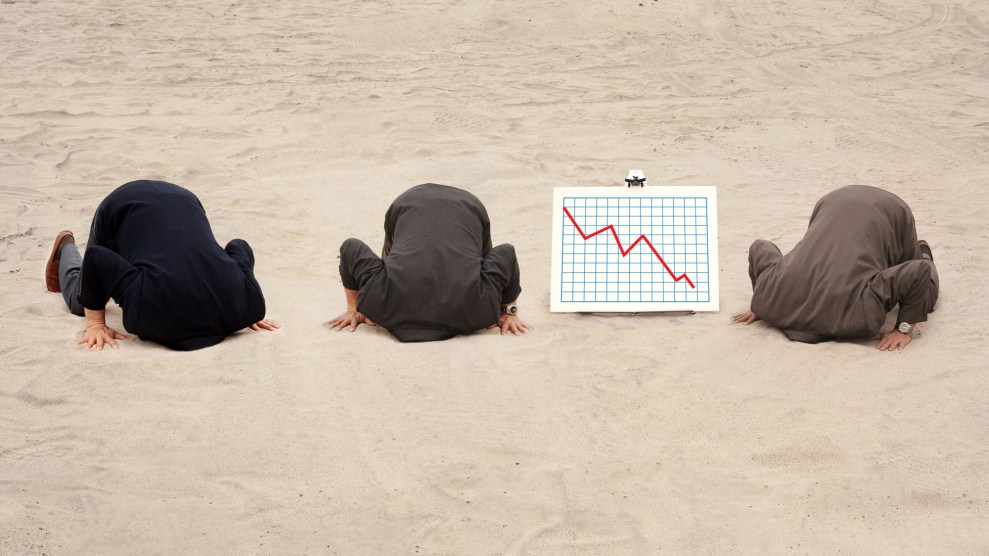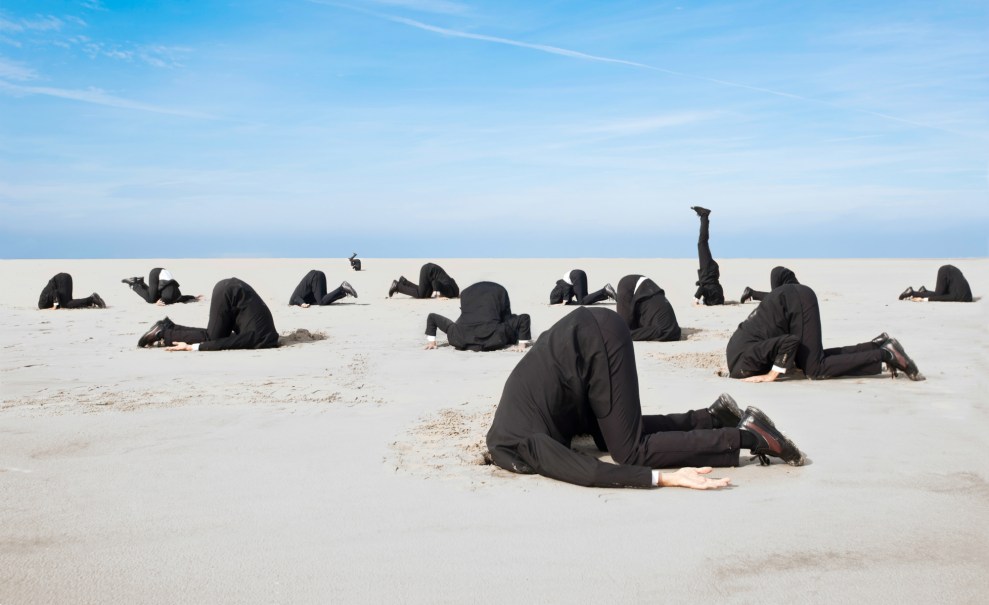
Zukovic/iStock
This story was originally published by the Bulletin of the Atomic Scientists. It appears here as part of the Climate Desk collaboration.
“Birds of a feather flock together,” so I am sure that nearly all of those reading this article accept the main findings of climate science. Yet many people don’t. Instead, they believe a variety of climate myths.
These include claims that the world isn’t warming; or if warming is occurring, it is natural and not human-caused; or volcanoes produce more carbon dioxide than we humans do. I know none of you believes these myths, but it seems that almost everybody has an unpleasant relative—call him Uncle Pete—who comes to dinner. Pete spoils the family mood by making these false claims, which he found on talk radio or the Internet. I’ll tell you in a moment why some of the most frequently repeated claims are just plain wrong. I won’t have time to cover all of them, and I recommend the website skepticalscience.com for the whole story. It’s a collection of the most commonly heard climate myths, and why they are all dead wrong. Skepticalscience.com is your key to refuting your own Uncle Pete.
Start with the myth that the warming we have observed in recent decades is natural and not human-caused. First off, let’s be clear: The climate has indeed changed naturally in the past, with ice ages being an obvious example. But natural causes simply cannot explain the recent warming. How do we know that? It’s very like the story of wildfires, which can be caused naturally, by lightning. But they can also be caused by people, either by carelessness or by arson. And wildfire experts can investigate after a wildfire and determine what caused it. They know how to do the detective work.
We climate scientists are good detectives too. We have discovered what paces the ice ages. It is the slow changes in the Earth’s orbit around the sun, which affect how sunlight is distributed over the Earth’s surface in the different seasons. Over many thousands of years, these effects are strong enough to cause ice ages to come and go. But over short times, just a few decades, the orbital changes have much too small an effect to produce the observed large warming that has recently occurred.
Through this kind of research, we have quantitatively ruled out all the other natural processes known to affect climate. For example, the sun powers the entire climate system, and the amount of energy given off by the sun does vary. But we measure this energy very accurately, and we can demonstrate that its changes are much too small to have caused the observed warming. As for the claim that the extra carbon dioxide added to the atmosphere by human activities is tiny compared to the amounts produced by volcanoes, that too fails quantitatively. Measurements show that human activities, mainly burning coal and oil and natural gas, produce about 100 times more carbon dioxide than volcanoes do.
By burning fossil fuels, we humans have taken over the role of deciding what the climate in coming decades will be. We are no longer passive spectators in the global climate change pageant. We have become the actors. Science provides convincing evidence that the heat-trapping gases produced by human activities are the main cause of the warming observed in recent decades. This aspect of climate science is very firmly established, going back to definitive laboratory experiments in the 1850s. Those experiments showed that carbon dioxide and other gases, present in small quantities in the atmosphere, have powerful heat-trapping properties. In recent decades, the fingerprint of the observed warming, such as how it varies with altitude and geography and season, matches the pattern that we expect from adding heat-trapping gases to the atmosphere. We’ve found the enemy. He is us.
There are similar convincing refutations of all the other common climate myths. That’s why many studies have shown that about 97 percent of the climate scientists who are most active in publishing research on climate change agree that the observed recent warming is real and serious and overwhelmingly human-caused. Nevertheless, Uncle Pete remains unconvinced. He continues to repeat the myths. You might well ask, “Why is Uncle Pete so stubborn and so resistant to overwhelming scientific evidence?” That’s a very good question, and here is my answer.
For many skeptics or contrarians like Pete, the climate change issue is not a science topic at all. For Pete, it is simply an opportunity for the government, and liberals and environmentalists, to make rules and regulations, to interfere with markets, and to diminish the personal freedom of individuals. For Pete, it is just one more way for the authority of the state to control the lives of citizens. This view has nothing to do with science, and no argument based only on science can change it. Uncle Pete, like some actual people I know, may seriously fear that the government will not only decide what kind of car he will be allowed to drive, but will ultimately want to force him to limit his individual carbon footprint, that is, to ration his personal emissions of heat-trapping gases.
Uncle Pete has a high opinion of the free market. He is confident that government actions tend to hinder free markets and thus have the effect of limiting economic progress. He is suspicious of subsidies for renewable energy. He is sure that renewables will never be feasible without big subsidies. Uncle Pete couches his opposition to carbon taxes or fees in statements of this sort: “If you let people keep more of their money, they will invest it in the future.” Once again, science is irrelevant here, and no claim that science has shown or proven this or that fact will change Uncle Pete’s mind. It’s sad but true that most Americans have never met a scientist. Uncle Pete may have his own somewhat strange ideas about how science works and what scientists do. The concept of “peer review” carries no weight at all with Pete; he can easily imagine a corrupt and powerful scientific establishment, conspiring to deny research funding to scientists who disagree with prevailing opinions, and to prevent them from publishing. Pete likes to mention Galileo as an example of an outlier in science who turns out to have been correct. He forgets that Galileos are extremely rare, and that almost everybody who considers himself a Galileo is badly mistaken. Pete may cite eugenics as evidence that the scientific mainstream is indeed sometimes wrong. Pete is very suspicious of us scientists.
Social science tells us that people tend to trust those who share their values and to distrust those who do not. We all know how controversial issues—such as abortion and evolution and gun control—can drive a wedge between people, bitterly dividing this country. And it is high time for us to realize that climate change is a very big “wedge issue” for Uncle Pete. His natural distrust of academics and elites generally is increased if he thinks climate scientists are arrogant people who are scornful of his opinions, who mock his values, and who dismiss his most firmly held convictions.
I urge each of you to engage with the Uncle Pete whom you may know. Have a civil conversation. In his heart, Uncle Pete would probably admit that everybody is entitled to his own opinions, but not to his own facts. When it comes to facts, we scientists have the high ground. The world is warming. It’s not a hoax. We measure it. The warming did not stop in 1998. All the warmest years are recent years. As this is written (late in 2018), 2016 is the warmest year on record globally, 2015 is second, 2017 is third, and 2014 is fourth. Natural processes such as El Niño affect year-to-year variations in global average temperature, but the overall trend is clearly upward. Global warming is definitely still continuing.
The atmosphere is warming, and so is the ocean. Sea level is rising. Ice sheets and glaciers are shrinking. Rainfall patterns and severe weather events are changing. Climate change is real, and serious, and happening right here, right now. And it isn’t natural. Human activities are the dominant cause of the climate changes we have observed in recent decades.
But none of these facts tells us exactly what we should do about climate change. Science can inform wise policy, but it cannot decree or prescribe what the best policies will be. There is no silver bullet, but there is lots of silver buckshot. The main barrier to action is a lack of political will.
In deciding climate policy, science matters, but so do values, priorities, and political convictions. Given the same facts, different reasonable people can easily prefer different policies. For Uncle Pete, attacking climate science and scientists is simply a disguise for what concerns him, which is the prospect of liberals and environmentalists dominating policy, and of a government spinning out of control, a government that in Pete’s view seizes power, limits freedoms, increases taxes, regulates markets, and diminishes prosperity.
We do not yet have national agreement on climate change. As you know—and I hope this will not shock anybody—some elected officials in the federal government sound just like Uncle Pete. Despite the strong scientific consensus, climate change policy is contentious politically.
One option for dealing with this political disagreement is to do nothing. Uncle Pete may well favor that option, because it appears to fit well with his sincere conviction that, “if you let people keep more of their money, they will invest it in the future.” On doing nothing, I may be able to help Uncle Pete think a bit more clearly.
I am not an expert on energy policy or taxes, but as a climate scientist, I can say something with very high confidence about what will happen if we do nothing. Deciding to do nothing about climate change is like deciding not to have serious elective surgery, such as declining a coronary artery bypass operation that your cardiologist recommends. The operation will involve risks and costs. But declining it will also involve risks and costs, including the risk of a fatal heart attack.
Sadly, we don’t have enough conversations about climate change. The media largely avoid the subject, and it was almost invisible in the recent campaign for president. Today, the fact is that we, you and I and the other 7.7 billion living people, now have our hands on the thermostat that controls the climate of our children and grandchildren. A considerable portion of the carbon dioxide we emit will remain in the atmosphere for centuries and longer. Thus, it accumulates. There is a given allowed amount of carbon dioxide in the atmosphere that we must not exceed if we want to limit warming to any particular target we pick. For the warming target of the Paris agreement, we’re already about half way to that allowed amount, so we do not have much time left to bring emissions to nearly zero. That’s why it’s urgent to drastically reduce global carbon dioxide emissions and to do it quickly before we exceed that amount.
It’s important to understand that once the world has agreed on a target of how much warming is to be allowed, science can say approximately how much more carbon dioxide can be emitted. The urgency of reducing emissions thus arises directly from the physics and chemistry of the climate system. It has nothing to do with politics.
Mother Nature reacts to the total amount of carbon dioxide. The more carbon dioxide there is in the atmosphere, the greater the climate change will be. If we who are alive today do nothing about climate change, and if the world continues to use the atmosphere as a free dump for carbon dioxide and other waste products of an energy system based on fossil fuels, then we are effectively sentencing future generations to the consequences of a severely disrupted climate. Also, the disruption will not be brief. It will take many thousands of years for the climate to recover after we stop emitting carbon dioxide. So it’s a long sentence. This is not a partisan political statement. It is well-supported, solid science.
The Pentagon, which is certainly not a cabal of liberal environmentalists, takes this issue very seriously, and it has repeatedly characterized unmitigated climate change as a threat multiplier. In the decades and centuries ahead, doing nothing means the world will inevitably see devastating climate change, including agricultural disasters on an immense scale and coastal cities abandoned worldwide, because of sea level increases of many feet.
Vast numbers of people will become environmental refugees, and we will see the destabilization of governments, especially in failed and failing states. In wealthy and powerful countries, like the United States, governments coping with severe climate change will surely have to act forcefully, including using emergency powers, as in wartime, to preserve order and to minimize chaos and damage. Ironically, in my view, doing nothing about climate change, Uncle Pete’s preference, is thus likely to force governments to do exactly what Uncle Pete fears most: seize power and limit freedoms. Doing nothing is a disastrous policy option.
In your civil and mutually respectful conversation with your own Uncle Pete, I hope you can help him think seriously about the prospect of such a horrible, but very preventable, future. We are at a critical crossroads. We still have a chance of limiting climate change to a tolerable level, a level that offers some hope of successful adaptation. Our window of opportunity is still open. But it won’t stay open much longer.
We must act. We can’t dither any longer. If Uncle Pete wants to keep the government from controlling his life and diminishing his freedom—as most all of us do—then we all need to learn about and accept the science. We all need to take the threat of climate change seriously. We all must act wisely, and urgently, to minimize that threat and thereby limit the damage of climate change to tolerable levels.
Editor’s note: This article is adapted from a presentation at a past annual dinner of the Bulletin of the Atomic Scientists, but remains relevant today.












